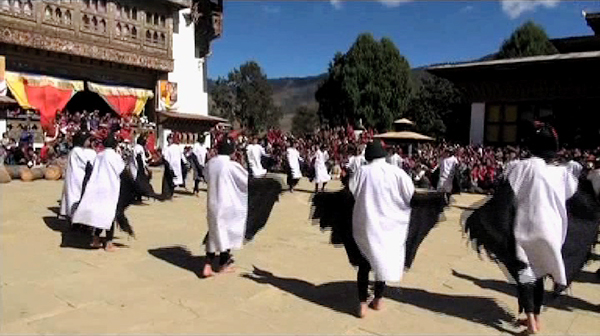 The Annual Black-Necked Crane festival in Gangtey and Phobjikha valley in Wangdue Phodrang is proving to be a successful medium in creating awareness among the locals on the importance of protecting cranes.
The Annual Black-Necked Crane festival in Gangtey and Phobjikha valley in Wangdue Phodrang is proving to be a successful medium in creating awareness among the locals on the importance of protecting cranes.
Over the years, the festival has also strengthened the bond between the bird and the locals.
The festival is being held annually on 11th November to commemorate the Birth Anniversary of His Majesty the Fourth Druk Gyalpo. It is an occasion for the locals to celebrate the endangered bird species’ arrival to its winter habitat.
The highlight of the festival is a Black-Necked crane dance performed by the students of Betta Primary School in Wangdue Phodrang. The dance features the Black-Necked crane’s life.
Gangtey-Phobji valley is considered the largest winter habitat of Black-necked Cranes in the country. The valley is receiving an increasing number of cranes over the years. Some 500 Black-Necked cranes came to the valley between October 2017 and February 2018. The locals attribute this to the improved bonding between the people in the community and the bird species ever since the start of the festival in the valley.
“For instance, when the cranes come to our fields looking for foods after the harvest, the locals never think of harming them. Instead, we always try to intervene, when Black-Necked cranes are being disturbed by other animals. Our people give care for the bird, and treat them as human beings,” said Jamtsho, the Phobji Gewog Gup in Wangdue Phodrang.
Owing to increased awareness on the importance of protecting the cranes, the locals have been very welcoming towards Black-necked cranes.
“Black-Necked Cranes are not much of harm as they arrive only after the harvest season. Although they eat some of our potatoes during the plantation, the people do not take it as a serious issue. So, the bird shares a friendly bond with the locals in the community,” said Sati, Phobji Gewog Mangmi in Wangdue Phodrang.
“I moved to Gangtey in 2008 and during that time the relationship between the locals and the bird was not so friendly. The locals seemed least bothered about the crane. Today one can see that the locals have so much respect for the bird,” added Nima, the Gangtey Gewog Gup in Wangdue Phodrang.
The festival which is usually celebrated for a day has now been extended to two days. The Wangdue Dzongkhag administration is organising the festival. The Royal Society for Protection of Nature (RSPN) which carries out crane conservation projects says the locals have a better understanding of the importance of the bird species now.
“There is a high chance of destroying and declining the Black-Necked Crane visiting sites. So, with such a programme, we are being able to create awareness about the importance of Black-Necked Cranes and to preserve their habitat sites in the community. Our programmes are going well so far since the locals have understood the importance of cranes by participating in every event,” said Jigme Tshering, from the RSPN.
Besides, the festival is also a source of attraction for tourists. More than eight hundred tourists including the regional tourists gathered to witness the festival and generated about Nu 400,000 in a day. The organisers decided to collect an entry fee of Nu 500 from each tourist since 2013 to sustain the festival. The money collected is being kept with the Gangtey- Phobji Environment Management Committee which works for the conservation of Black-necked Cranes, to carry out the waste management works at Ramsar sites, habitat for the Black-Necked Crane. The committee member comprises of sector heads, Local Government Leaders and school teachers in the Gewogs.
The Gangtey Black-Necked Crane Festival was introduced in 1999 with financial support from the International Crane Foundation.
Changa Dorji




